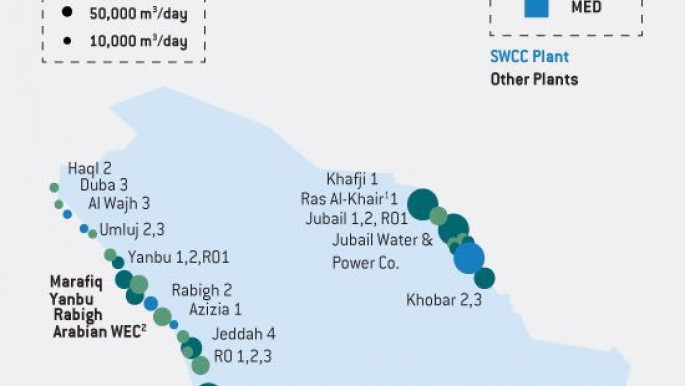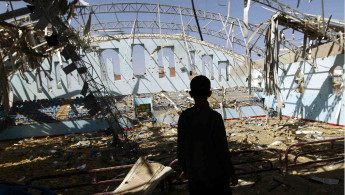'It's all about the water': Former Saudi spy reveals reasons behind Lebanon crisis
The Arab League met in Cairo on Sunday, calling for an end to Iran's interference in the region and declaring the Lebanese party, Hizballah, a part of the current Lebanese government, a terrorist organization - an accusation that President Aoun rejected.
Aimen Dean, a Saudi-born former UK spy draws his analysis on the current situation in Lebanon from first-hand sources in the GIP, Saudi Arabia's prime security intelligence apparatus, among other sources.
The New Arab discussed Saudi's rationale in pressuring Lebanon's delicate institutional balance - and what the main interests for the other key geopolitical powers might be.
Opinions expressed in this article remain those of the author and do not necessarily represent those of The New Arab, its editorial board or staff.
The New Arab (TNA): What triggered the present crisis in Lebanon?
Aimen Dean (AD): Yemen. When a ballistic missile was fired from the Houthis directed toward Riyadh's capital, Saudi Arabia called on Lebanon's PM Hariri to intervene to halt Hizballah's activity in Yemen. Because Hizballah is part of the current Lebanese government, the Saudi crown prince, Mohammed bin Salman, decided to flex his muscle and send a strong message to Iran by destabilizing Lebanon's institutions.
TNA: What is the background for this geopolitical power struggle in Yemen?
AD: Saudi Arabia's current sense of endangerment comes from there. In September 2014, when the Houthis took over the country's army arsenal, Saudi's alarm bells began to ring. Its eternal nemesis, Iran, could threaten Saudi's water resources (its 17 desalination plants) through the Houthis and Hizballah, in its entirety.
 |
|
| Aimen Dean is a former Saudi-born UK spy against al-Qaeda |
This is why in April 2015, the Saudis targeted a mountain site where the Houthis kept ballistic missiles. The explosion was extremely violent, comparable to eight percent of Hiroshima.
A red-line was drawn, whereby if the Houthis were to take over al-Anad strategic airbase, this would mean for Saudi Arabia that the Houthis wanted to be a missile base for Iran, a situation comparable to the Cuban missile crisis.
|
|
||
| Translation: Watch the strongest and most violent explosion of weapons stores in Sanaa from several angles |
In January 2015 the Saudis took a strategic shift, with the death of king Abdullah and the refusal by the Houthis to hand over their ballistic missiles to a third party, launching a full on war on Yemen. These missiles are perceived on their part as crucial for their existential security, their energy and mercantile shipping.
A red-line was drawn, whereby if the Houthis were to take over Al-Anad strategic airbase; this would mean for Saudi Arabia that the Houthis wanted to be a missile base for Iran, a situation comparable to the Cuban missile crisis. A war that, still today, comes at a tragic cost for civilians in Yemen.
TNA: What role does Hizballah play in Yemen?
AD: Hizballah sent its expert commanders, to support the Houthis to develop their capabilities, including their missile capabilities. Iran was supplying missiles including the one that was destined to hit the Riyadh airport.
Iranian and Hizballah operatives helped the Houthis to operate the missiles, as well as suicide speedboats targeting Saudi and Emirati shipping. Hizballah is instrumental in training the Houthi militia, giving them instructions on mountain warfare, giving them technology and showing them how to operate it.
TNA: Does the existence of a Houthi missile arsenal represent an existential threat for the Saudi kingdom?
AD: Yes. The Saudis never said why they went to war because no one goes to war stating they are vulnerable. Particularly Saudi - which is such a secretive kingdom.
A direct source from the Saudi ministry of foreign affairs, who attended a meeting with US Secretary of State, John F. Kerry and [Saudi foreign minister] Adel Jubeir in August 2016, gave me the insight that shows this strategic importance to the Saudis.
 |
The Houthis are threatening Saudi Arabia's strategic security [meaning water security] |  |
Jubeir said: "We want the Houthis to hand all its short-range and medium-range ballistic missiles over to a third party and to leave Hodeida port under UN protection.
"If they agree to this we will end hostilities. How is it possible that a militia, a non-state actor, has a missile capability that surpasses that of Egypt, Turkey, Syria and Iraq put together?
"They are threatening our strategic security [meaning their water security]."
TNA: Do you know where the missile launched against the Riyadh airport was from?
AD: The missile was a purely Iranian missile now confirmed by the US. All debris has been examined by the French military intelligence stationed in Saudi. Recently, most of them are Iranian-made. Before they used to be Soviet made, Chinese-made then North Korean-made. When the US announced the fact the debris was Iranian-made they were actually reliant on a French assessment.
TNA: Why is this current retaliation, for a Yemeni missile strike against Riyadh airport, targeting Lebanon?
AD: The Saudis are already bombing Yemen extensively; causing extreme human suffering and they cannot retaliate against Iran directly because it would ignite a regional conflict.
The most precious regional arm of Iran is Hizballah. This is why they want to make life hell for Hizballah. The attempt to hit the Riyadh airport was actually retaliation on the Iranian part for the Saudis having killed Iranian experts in Yemen two days before and gloating about it in their news.
 |
|
| [Click to expand] Saudi Arabia's manjor desalination plants [Saudi Water Investment Forum] |
This is why Saudis are being so vicious in Yemen, increasing their air power and simultaneously targeting Hizballah. They are ready to use economic sanctions, leave Lebanon without a government and reach sectarian infighting – to weaken Iran via Hizballah by any means. They are also taking advantage of their closer and closer alliance with Israel.
TNA: What is stopping Saudi and Israel from a full-blown conflict against Hizballah in Lebanon? What role does the US play?
AD: Firstly, let me state that to think the Saudis are being held back by the US is a misconception.
The Saudis will do whatever they want for their security: let's not forget that they went to war in Yemen without telling the US and they went into Bahrain in 2011 despite Secretary of State, Hilary Clinton, objecting heavily.
While Secretary of State Tillerson is being cautious, a Saudi-friendly administration is going to allow them to go in and do as they like. The Saudis are furious about Hizballah's involvement.
When the Kuwaitis, Bahrainis, Emiratis and the Saudis have requested their citizens to leave Lebanon it's because they anticipate doing something - but I am not saying this action could be immediate.
TNA: In terms of economic sanctions directed against Hizballah via Lebanon, what can be expected in the near future?
AD: My understanding from my sources at the Saudi foreign ministry is that there will not be any significant deportation of (Lebanese) citizens working in the Kingdom.
 |
There will be a block on direct remittances, making it impossible to send money directly from Saudi Arabia to Lebanon. This could also extend to the UAE |  |
There will be a block on direct remittances, making it impossible to send money directly from Saudi Arabia to Lebanon. This could also extend to the UAE.
Between both countries this would mean blocking around 200,000 remittances and that would be a high cost for Lebanon.
Another measure could be for Saudi to call for repayment of its loans (around $4 billion) from the Lebanese Central Bank. They have a wide range of options to make life difficult for Lebanon. I believe the economic measures will be intended at first to intimidate and then to hurt.
TNA: How is Secretary General Hassan Nasrallah's statement about Yemen significant?
AD: When Hizballah says they will pull out of Syria and Iraq but not in Yemen, for the Saudis this is the most important strategic point and Hizballah knows it.
While I believe the economic sanctions will come first - they will be followed at some point by a provocation to ignite tensions in Lebanon internally, pushing Hizballah to the brink of a civil war.
TNA: What about Israel's role?
AD: What Mohammed bin Salman [MbS] is trying to do is to consolidate his hegemony by being unpredictable. The Iranians used to be able to play a very good chess game with the Saudis who were predictable until now.
MbS has decided to throw the whole chess board away by becoming unpredictable for the Iranians. The Israelis are cautious, they are aware this situation could ignite a real conflict. At the same time Netanyahu is delighted because this could possibly drag Saudi Arabia, the UAE and even Egypt into dealing with Hizballah.
The real question is not if Israel would join a war against Hizballah but rather if it will allow the Saudis to fly over Israeli-protected air space to deliver their air strikes.
Gaja Pellegrini-Bettoli is a freelance journalist based in Beirut.
You can follow her on Twitter at @gajapell.



